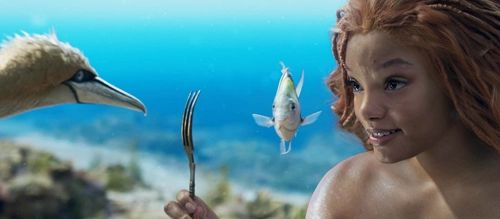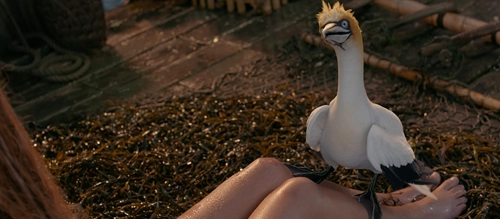The Little Mermaid (2023) Review

The Little Mermaid (2023)
Director: Rob Marshall
Screenwriter: David Magee
Starring: Halle Bailey, Johan Hauer-King, Daveed Diggs, Awkwafina, Jacob Tremblay, Noma Dumezweni, Art Malik, Javier Bardem, Melissa McCarthy
For months leading up to the release of The Little Mermaid, Disney promoted their 2023 iteration as being a bold, feminist update of its 1989 animated classic. This tactic is nothing new for Disney. For nearly 10 years, beginning with Cinderella in 2015, Disney has been steadily working toward remaking all of its animated movies, justifying their existence by saying they were correcting all of the problematic, sexist, and outdated things found in the originals. But, as should be abundantly clear by now, Disney is not so much interested in progress as it is in the appearance of it. The company’s recent attempts at diversity are shallow at best and disingenuous at worst. The Little Mermaid is no exception, and not even Halle Bailey’s powerhouse vocals can save this movie from being revealed as the soulless cash grab that it is.
Despite being advertised as fresh and inventive, The Little Mermaid sticks to all of the same story beats as the original – without any of the emotional weight – save for a few exceptions. This movie has nothing to say that hasn’t already been said, and the changes the filmmakers do end up making create one big convoluted mess that robs Ariel of her agency more than it adds to it.
Halle Bailey tries. She really does. But she is utterly on her own, desperately trying to add some magic to a movie completely devoid of life. Her vocal performance is the only highlight of The Little Mermaid (2023), and her version of “Part of Your World” is delightfully different from Jodi Benson’s. It’s a treat to listen to. But when she isn’t singing, Bailey is lost. Instead of trying enthusiastically to covey her feelings by any means necessary, Ariel goes through the middle of the movie completely checked out. Instead of excitement and curiosity for the human world, Bailey plays her as confused, walking around with a blank stare for much of the last half of the movie.
The rest of the cast’s performances are dull and uninspired. Oscar-winner Javier Bardem is utterly bored as King Triton, and Oscar-nominee Melissa McCarthy lacks the gravitas and allure of Pat Carroll’s original vocal performance. Ariel’s sisters are essentially non-characters, which is certainly a choice considering Disney went to the trouble of making and trying to market dolls of them. Awkwafina and Daveed Diggs are fine, if a little annoying, as Scuttle and Sebastian respectively, but they’re constantly dragged down by the fact that Disney’s creepy, pseudo-photo-realistic animals are incapable of emoting.

The decision to downplay Ariel’s affection and attraction to Eric (Johan Hauer-King) is bewildering. The criticism that Ariel only wanted to become human and leave her culture behind for a man doesn’t have any basis in the original film. As it has been pointed out countless times, Ariel sings “Part of Your World” before she even meets Eric. Her wants and desires are made abundantly clear. But since Disney is committed to fundamentally misunderstanding its own film, Rob Marshall and screenwriter David Magee overcorrect to the point where Ariel seems completely indifferent to Eric. She never confirms nor denies her feelings for him, and when she decides to take Ursula’s deal, she just seems stupid rather than reckless and desperate to get what she wants. Ariel’s steadfast belief that she has found her true love is a feature, not a bug, and the idea that women cannot be strong characters while also being in love is not the feminist statement Disney thinks it is.
While the filmmakers attempt to add depth to the central relationship, it’s obvious how afraid they are of expressing any kind of genuine passion on screen. Hauer-King’s dead-eyed portrayal of Eric doesn’t help matters, and their scenes simply bloat the runtime instead of adding anything substantial to the story.
The much-discussed lyric changes to “Poor Unfortunate Souls” and “Kiss the Girl” don’t end up making any more sense in context than they did before the movie was released. In general, though, The Little Mermaid doesn’t seem interested in being a musical. The filmmakers cut most of the ensemble music in favor of new tunes written by Lin-Manuel Miranda and Alan Menken. Scuttle’s song is so unnecessary and grating that it’s difficult to listen to, and Miranda’s signature style just doesn’t mesh with the rest of the songs. He may be in demand now, but Howard Ashman he is not.
The movie doesn’t begin with a concert. We don’t see the vast sea palace or get to see Ariel’s sisters introduce themselves through song. Instead, the movie begins with a mermaid council meeting – one that is exactly as boring as it sounds. Rob Marshall is no stranger to musicals – he directed the Oscar-winning adaptation of Chicago – so it’s difficult to understand what exactly went wrong here. But the camera work is lazy and unimaginative, and the editing doesn’t match the energy of the songs, the latter of which is especially egregious during “Under the Sea”.
The underwater scenes are passable, but there does seem to be a layer of grime over every frame as if Ariel lives in a murky lake rather than a vast, colorful ocean. It’s difficult to see Ariel’s treasure trove and it’s nearly impossible to make out Ursula’s shape against the darkened sky during the climax of the film. When films like Avatar exist it’s hard to forgive how uncanny everything looks.
Ariel does save the day in the end, but it’s too little too late. Disney’s inability to take a risk and make something truly subversive and bold is the film’s ultimate downfall. Young girls shouldn’t have to settle for a half-assed attempt at representation. They should be given their own stories and their own adventures, instead of a pale imitation of a much better movie.
Score: 6/24

